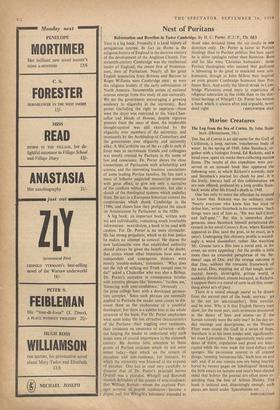Nest of Puritans
Reformation and Reaction in Tudor Cambridge. By H. C. Porter. (C.U.P., 52s. 15(1.) THis is a big book. Formally it is local history of antiquarian interest. In fact its theme is the religious history of England in the decisive century of the development of the Anglican Church. For sixteenth-century Cambridge was the intellectual leader of England, the centre first of Protestan- tism, then of Puritanism. Nearly all the great English separatists from Browne and Barrow to Roger Williams were Cambridge men : so were the religious leaders of the early colonisation of North America. Innumerable points of national interest emerge from this study of one university. We see the government encouraging a growing tendency to oligarchy in the university. Real power (including the right to imprison—those were the days) was restricted to the Vice-Chan- cellor and Heads of Houses, despite vigorous protests from the mass of dons. An intolerable thought-control was still exercised by the oligarchy over members of the university, and incessantly by the Archbishop of Canterbury and the government over oligarchy and university alike. A McCarthYite use of the ex officio oath tb force men to incriminate friends and colleagues was stoutly resisted by Puritans in the name of law and conscience. Dr. Porter shows the close connections of Puritanistn with scholarship and science, and the interesting business associations of some leading Puritan families. He has used a mass of hitherto neglected manuscript material with great effect, to give not only a narrative of the conflicts within the university, but also a sketch of the theological systems which underlay them. He sets in a European historical context the controversies which shook Cambridge in the 1590s, and shows how they prefigured the attack on Arminianism by Parliament in the 1620s.
A big book; an important book, written with wit and individuality, containing much invaluable information : nevertheless, a book to be used with caution. For Dr. Portei is no mere chronicler. He has strong prejudices, which to do him justice he makes no attempt to conceal. He shares the now fashionable view that established authority should always be given the benefit of the doubt, that critics whom other historians have seen as independent and courageous thinkers were merely 'trouble-makers,' extremists."What does not the itch of seeking out Truth compel men to do?' asked a Chancellor who was also a Bishop. Dr. Porter's narrative in consequence bristles with emotive phrases like 'tiresome,' 'tactless ass,' 'bouncing with over-confidence,' obviously . . . the prize college bore with a developed persecu- tion complex.' Since such phrases are normally applied to Puritans the reader soon comes to dis- count them as the exuberance of a youthful theologian; but there is a subtler bias in the whole structure of the book. For Dr. Porter emphasises what seem today the less attractive characteristics of the Puritans—their niggling over vestments, their insistence on assurance of salvation—with- out helping the reader to understand why such issues were of crucial importance in the sixteenth century. He devotes little attention to those points of Puritan criticism which do not seem minor today—their attack on the system of pluralism and non-residence, for instance, by which the university was financed at the expense of parishes. One has to read very carefully to discover that of Dr. Porter's principal heroes Overall was a pluralist, Whitgift and Bancroft staunch defenders of the system of non-residence; that William Barrett—whom the captious Puri- tans accused of, popish tendencies—became a papist; and that Whitgift's 'tolerance' extended to those who deviated from the via media in one direction only. Dr. Porter is fairer to Puritan theology than to Puritan politics; but here again he is often apologist rather than historian. Baro and his like were 'Christian humanists': those Puritan theologians who insisted that godliness is labouring to do good to mankind were anti- humanist, though in John Milton they inspired an even greater Cambridge humanist than Pro- fessor Baro. And surely the liberal streak in Cam- bridge Platonism owed more to experience of religious toleration in the 1640s than to the doc- trinal heritage of Whitgift? Dr. Porter has written a book which is always alive and arguable, never


































 Previous page
Previous page